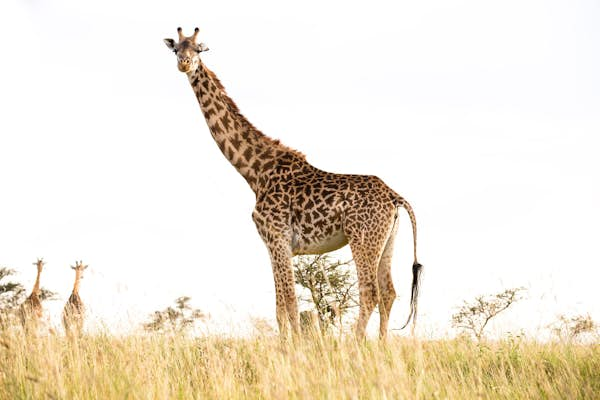Nairobi is known as the green city in the sun for good reason. After all, despite developing at a dizzying pace, it but still boasts areas of serene forest and sprawling savannah where visitors can get up close to some of Kenya’s famed safari species. Here are the top five places to spot Nairobi wildlife.

Nairobi National Park
Nairobi is quite literally the world’s wildlife capital. And that’s not just because it’s the only capital city with a national park, but rather because of what wildlife roams within its boundaries. Imagine seeing wild lions lazing and giraffes grazing, all against a backdrop of not-so-distant skyscrapers. In total there are 117 square kilometres of wilderness to explore, with the grass plains sustaining antelopes, hyenas, buffaloes, giraffes and noisy troops of baboons, and the acacia bush sheltering lions, leopards and endangered black rhinos. Birdlife here is incredibly diverse, with more than 400 migratory and endemic species recorded. Choose between an early morning or late afternoon wildlife drive, when the animals are most active. You can even stop for a break at one of the park’s picnic sites to take in some of the sweeping views. The historic Ivory-burning Site, where tonnes of elephants tusks were incinerated in 1989 and 2016 as a message against the illegal ivory trade, is also worth a visit. If one wildlife drive isn’t enough, you can choose to stay at any of the park’s three campsites or at the Nairobi Tented Camp, which is a more luxurious option. If you’re keen on hiking, there are also some scenic walking trails.
Nairobi Safari Walk
This is a great extension to your safari around Nairobi National Park. Run by the Kenya Wildlife Service, who manage the country’s national parks and reserves, the Nairobi Safari Walk is essentially a zoo-like experience that provides you with a glimpse into the incredible biodiversity of Kenya’s protected areas from its raised wooden platform. The walk takes you through three stages that mimic the nation’s major ecosystems – wetlands, savannah, forests – and past a wide variety of wildlife, which ranges from mammals and reptiles to insects and birds. You’ll have a chance to see the white rhino, pygmy hippo, albino zebra, and the rare bongo antelope, as well as big cats and primates. The walk is a favourite with children, who love getting close to the animals, and there is also a Children’s Museum that you can visit before leaving.

David Sheldrick Wildlife Trust
If you have just one day in Nairobi, make sure you set aside a morning to visit the David Sheldrick Wildlife Trust (DSWT). This elephant rescue and rehabilitation centre is one of the city’s favourite wildlife attractions. You’ll have a chance to get up close to cheeky baby elephants, but be warned that you may get a little muddy! Arrive by 10.30am to get a good spot in the viewing area that surrounds the watering hole. At 11am, around a dozen baby elephants, escorted by their handlers, stomp their way towards you. An extremely knowledgeable keeper introduces each orphaned elephant and shares their story, while you watch them grab at their bottles and slosh about in muddy water, occasionally bumping into bystanders. Visitors are encouraged to adopt a baby elephant, which costs US$50 per year. Those who do so can arrange to visit their elephant in the stockades before their bedtime. Crucially, the DSWT has a high success rate in reintroducing these elephants back into the wild. The trust also looks after orphaned rhinos, and is home to warthogs who trot freely around the grounds. The gift shop is worth a visit and is full of colourful souvenirs.
Giraffe Centre
The Giraffe Centre makes a great next stop as it is also located in the neighbourhood of Karen near the DSWT. This is the only sanctuary within a capital city where visitors can get up close and personal with the world’s tallest animal. From a raised platform with a 360-degree view of the grounds, you can feed the giraffes food pellets with your hands. If you’re not squeamish and don’t mind a close encounter with these gentle giants’ tongues, you can go a step further and feed them using your mouth. The sanctuary has an educational centre for those interested in learning more about the highly endangered Rothschild giraffe (a species this centre has helped to repopulate in the wild) and it works hard to inspire school children, youths and local communities to interact with nature and protect their environment. It is also home to warthogs, plodding tortoises and more than fifty species of birds, so there’s plenty to see. Refresh yourself at the little cafe before you move on. Bird watchers may want to continue with a self-guided forest walk through the adjacent Gogo Rivery Bird Sanctuary.

Karura Forest
Head north to Karura Forest, a firm favourite among locals for walking, cycling, running and horse riding under its shady green canopy. The late Professor Wangari Maathai, Nobel Peace Prize laureate and leader of the Green Belt Movement, risked her life to save the forest from developers, and it’s become a symbol of the fight against land grabbing in Kenya. Today, it is home to a variety of animals, including small antelopes, bush pigs, genets, civets, honey badgers, bush babies, porcupines, monkeys, squirrels, hares and bats. It’s not uncommon for a jogger to cross paths with a startled duiker. Karura Forest also hosts one of Nairobi’s most popular cafes, the River Cafe, where visitors can gaze at the birdlife while sipping on their coffee. The cafe is popular with groups and families so make sure to book a table at the weekend.
Make the most of your travel with sightseeing tours and activities from our trusted partners.
